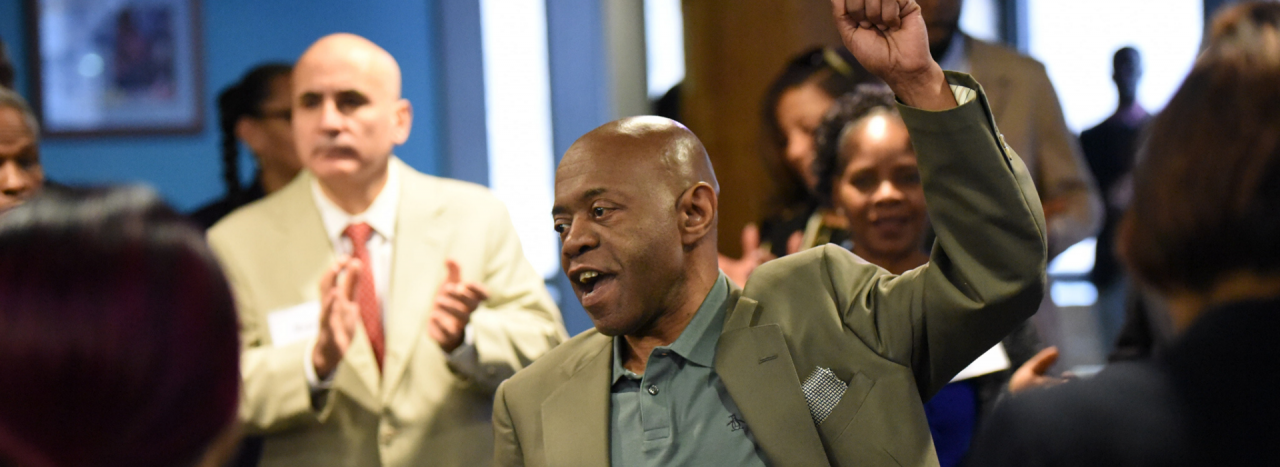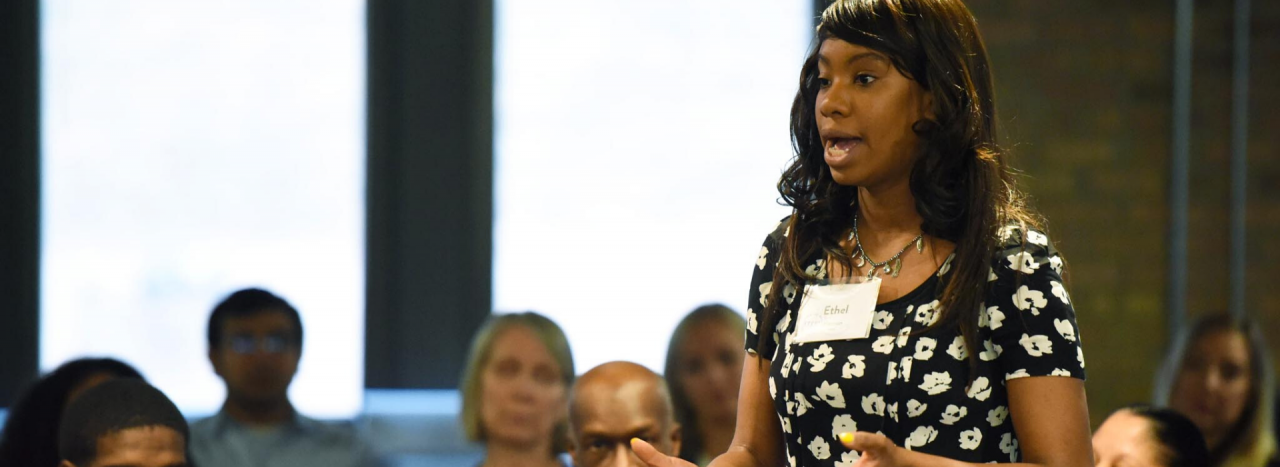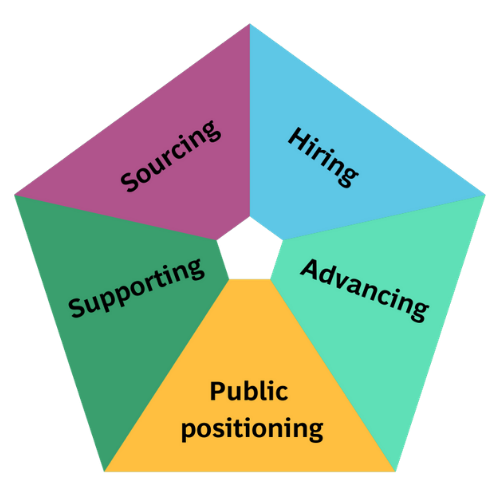
Inclusive employment in a post-COVID world
Article highlights
This new #CPIListens interviews @CaraChicago, a workforce development org dedicated to promoting #inclusiveemployment
Share article.@CPI_foundation talk to @CaraChicago about their 5 levers to #inclusiveempoyment: sourcing, hiring, supporting, advancing & public position
Share article.@JohnBurgoyne & Elysa interview @CaraChicago, believing that more #inclusiveemployment initiatives are needed in the #postCOVID19 reality
Share articlePartnering for Learning
We put our vision for government into practice through learning partner projects that align with our values and help reimagine government so that it works for everyone.
Sara Wasserteil and Sasha Ongtengco work for Cara, a 30-year-old workforce development organization based in Chicago. As they explained to CPI's John Burgoyne and Elysa Neumann, it is dedicated to promoting inclusive employment - finding jobs for individuals with barriers to employment and enabling employers to reach untapped talent pools. “We aim to expand employers' thinking,” Sara explained,
Encourage them to hire and cultivate talent from communities traditionally sidelined by the mainstream economy.
"These communities have justice involvement in their background, lower educational credentials, long gaps in their work history, or have faced other misfortunes or injustices that have made it difficult for them to obtain or retain employment. Inclusive employment cultivates these talent pools, so that there are pathways out of poverty.”
Five levers for inclusive employment
Cara has defined five levers for employers to embrace inclusive employment:
Cara recommends that employers go "beyond traditional recruitment approaches [and develop] partnerships with community organizations that have a strong track record of placing these talent pools into jobs" - just like Cara itself. They encourage employers to hire inclusively by “looking at individuals who don't meet traditional qualifications and showing how their contribution can add to the bottom line”. But Sasha has often found that new hires “are in, but they're not set up for success”. So, they support new hires by, for example, “finding mentors and training supervisors to be more empathetic, and then creating pathways for advancement within that organization”.
The fifth lever, public positioning, means “having employers take a public stance by speaking more candidly about their commitment to hiring from historically disinvested communities,” says Sasha, “and to serve as a mentor to other companies about what it's like to be inclusive.” Sara points out that “many employers are willing to hire second-chance people with a criminal background, but are skittish about publicizing it because there is so much taboo attached. We need more people like Jamie Dimon, JP Morgan's CEO, to take a stand and say ‘we are actively hiring from these populations'.” One challenge is that inclusion is often siloed into a single diversity initiative.
For inclusive employment to take hold, we need C-suite buy-in, embedded in HR and throughout the organization, and understood and accepted by frontline managers. - Sara
How does inclusive employment make a positive impact?
As evidence of the benefits of hiring inclusively, Sasha cites the 2018 survey of 1,000 managers by the Society for Human Resource Management and the Charles Koch Institute.
It found that, of companies who have hired workers with criminal records, 82% of managers thought that they were of the same or higher quality than those without criminal records.
She adds that “there are many champions within companies who know that individuals out there bring value, but they don't have the decision-making authority to make changes in those policies. It just needs leadership and a complete revamping of the ideological approach from business.”
Sasha went on to explain that, in the past decade, Cara has seen over 70% retention rates for the talent they have introduced to employers. (The national average in the US is just 50% across the same industries.) And 70% retention “really adds up for a business. It speaks to the shift in perspective that is needed and leads to more sustainable impact.” Sara talks about the impact of such policies on “conscious consumers”, millennials who care about how businesses recruit their staff and are more likely to choose companies that take an inclusive approach. “One thing the public sector can do is provide seals of approval,” she continues. “For example, an employer could be accredited as not just a Great Place to Work, but also as one of the most inclusive places to work. This could even be extended to places, the most inclusive city to work in.”
The pandemic has brought new challenges and opportunities
The discussion then turned to the impact of the COVID-19 pandemic. “The essential jobs were largely filled by the residents of disadvantaged neighborhoods. We're talking about more risk,” says Sasha. “Cara was very proactive in taking measures to support and protect individuals choosing to work in these essential positions, such as providing hazard pay and PPE. We wanted to support employees from Cara and also to show our partners what it means to show up in the face of hardship.”

The restaurant, fitness, and hospitality industries have been among the hardest hit in the US - and the restaurant industry is “one of the most forgiving for those with criminal justice backgrounds”, says Sasha. These closures created a lot of job losses. Sara reflects that the hardest-hit industries will be slowest to rebound. “Which companies are going to replace those jobs? When those industries are shrinking, how do we make sure the second-chance people don't get left behind?” “ [The pandemic's impact] helped us understand where real economic value lies,” added Sasha. “What is it that keeps an economy sustainable and going? Many of the services that are overlooked or undervalued - grocery stores, postal delivery, garbage collection - these jobs are and always will be essential. We must keep hold of this perspective after the pandemic. At Cara, we will continue promoting that message.”
But, when looking towards recovery, Sara noted that because so many jobs were lost, “employers will be hiring on a bigger scale and can reset their employment practices on a bigger scale.” This includes employers' commitment to racial equality.
“At the moment, especially in the wake of the death of George Floyd, companies are facing internal, external, and moral pressure not just to say something but also to act. There is no justice for these populations if there are no job opportunities."
While it is not the solution, we believe inclusive employment is one way we can seek justice and bring equity in these times.
Reimagining inclusive policymaking
What initiatives would they like to see in the future? “We need living wages and a basic safety net,” says Sara, “so that stability isn't tied to your job. We talk about housing and healthcare - however you cut it, we don't have equitable policies.” This is also true of digital access. Sasha notes that “there are some things the pandemic exposed about capabilities. For example, internet service providers were quick to improve internet capabilities in communities with poor service. We'd like to see that remain after the pandemic.” She suggests that:
If quality of life became the success indicator for society, then that completely shifts the types of policies we pursue, the way we assign value to our peers and neighbours, the way resources are distributed and allocated.
The debate should include the voices of those who have been impacted by the pandemic. “Policy is often created in siloes and it's more important than ever to look at the ways policies and inequities within different systems are interconnected.”
Sara discusses government's role in ensuring that citizens' voices are heard. “Politicians go on a listening tour, but people don't always see their feedback reflected in policy. We lose trust with the most disenfranchised communities when we don't circle back and say: ‘here's what we did, and here's what we didn't do, and why'. Broken promises erode trust - people say to government ‘you keep inviting us to the table but none of our advice is being heard'. Not only do you need to listen, but you need to report back. So, when something wasn't taken into account, people understand why. And just because something didn't work doesn't mean it's wrong.”

Sasha agrees and says that “there's something really important and powerful and healing about just saying sorry, very candidly, when something didn't work. ‘We really tried this, and would love to re-envision this with your help', that kind of admission creates conditions for devising and crafting the best solution. When we see initiatives that are rolling out now,” she continues, “we see more coordinated effort among organizations. For example, Chicago's Neighborhood Rebuild Program targets at-risk youth and justice-involved individuals and recognizes the impact of a more coordinated and collaborative approach, combined with relentless engagement.”
Cara's work in Chicago demonstrates both relentless engagement and careful attention to voices from sidelined communities, and it should inspire inclusive employment initiatives around the world. Because in the post-COVID reality, such initiatives are needed more urgently than ever.
#CPIListens

How are the systems you work in responding to the COVID-19 crisis?
Have the structures and culture you work within enabled a better response to the crisis, or do we need to consider what should be changed as we begin to look ahead?
You may also be interested in...


Climate leaders overcome funding challenges by “hacking” bureaucracy and building resilient coalitions

How do you understand impact in complex systems?

PRESS RELEASE: Centre for Public Impact announces Natalie Creary as Regional Director for Europe

Embracing the paradox: the urgency of climate action and the power of learning from failure
